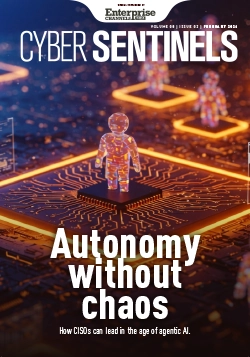Sumeet Agrawal, VP – Product Management for Agentic AI and iPaaS at Informatica, explains why the data layer is the unsung hero behind every successful agentic AI deployment—and what it takes to build one that’s scalable, secure, and smart.
Why is the data layer so critical to the development of agentic AI systems?
I like to think of an AI agent a bit like a world-class chef, with its reasoning and intelligence akin to extraordinary culinary skill. But even the best chef is only as good as the ingredients they work with. Without high-quality, fresh ingredients, even the most talented chef risks serving something that’s not just substandard but potentially harmful. The same is true for agentic AI systems: their potential is vast, but entirely dependent on the data they can access.
This is why the data layer is absolutely fundamental to agentic AI. It provides the facts and context agents need to make intelligent decisions, in real time, and grounds those decisions in reality rather than in a model’s imperfect memory. Without this, you risk hallucinations and errors, which can erode trust in the technology.
It also unlocks autonomous action. An agent that “thinks” but cannot “do” is of limited use. The data layer connects reasoning with real-world execution, providing live, verified information and the means to act on it. And beyond that, it enables much more sophisticated reasoning — providing an agent with the right context, intent and historical knowledge to become adaptive, rather than generic.
In short, the data layer is what allows agentic AI systems to behave intelligently, safely and autonomously in the real world. Without it, even the most advanced AI risks becoming little more than an impressive but impractical demonstration.
Agentic AI thrives on context awareness. How does Informatica’s data platform support real-time data ingestion, integration, and transformation to enable this?
One of the defining characteristics of agentic AI is its reliance on up-to-date, trustworthy context. In many use cases, it needs to sense and react to the world as it changes. Delivering that isn’t trivial, given the largely autonomous nature of these systems. Trust in the quality, availability and integrity is paramount and it’s where Informatica’s platform really comes into its own.
We’ve designed our platform to act almost like a central nervous system for AI agents, feeding them the real-time, high-quality data they need to operate effectively. Firstly, we ensure real-time access. Being famously vendor neutral, our solution connects to virtually any data source and streams information with low latency. That means the agent can perceive the world as it is now, not as it was five minutes ago.
We also don’t just deliver raw data, but clean, enriched and reliable data. Through intelligent transformations and embedded data quality, our platform ensures agents act on trustworthy information, not “garbage in”. And of course, we provide enterprise-grade guardrails with security, governance and scalability all baked in. So autonomous agents can operate within organisational policies without introducing new risks.
What’s important is that all of this happens on a single, unified platform, driven by our CLAIRE AI engine. That avoids the complexity and lag of stitching together different tools, and means the agent always has access to the right information, in the right format, exactly when it’s needed.
What are the key challenges organizations face in preparing their data layer for agentic AI, and how does Informatica help address them?
It’s multifold really, being as much about people and processes as it is about technology.
Firstly, there’s a clear skill gap. Building and managing the complex data pipelines that AI depends on has traditionally required highly specialised expertise. That’s not scalable. At Informatica, we’ve focused on democratising access. Our platform includes a natural language interface and an AI-powered copilot, so even non-specialists can build and deploy data pipelines. This opens up agentic AI development to a far wider group of users.
Another major hurdle is integration and trust. Too often, data remains locked in silos, riddled with inconsistencies and questionable quality. Unchecked, this would prove to be the Achilles heel of any intelligent system. We solve that by giving organisations a way to integrate all of their enterprise data seamlessly, while enforcing quality and reliability at every step.
And finally, there’s governance and control. You can’t unleash autonomous agents into business processes without proper oversight — that’s almost a sure shot recipe for backlash and risk. That’s why we’ve developed a unified platform where organisations can monitor, govern, and scale their entire agent workforce, ensuring compliance and control as initiatives grow.
Moreover, to help organisations get started quickly, we’ve also introduced our AI Agent Hub, with pre-configured, enterprise-ready agents that can be deployed as a foundation and customised as needed.
How does Informatica’s Intelligent Data Management Cloud enable the continuous learning and adaptive feedback loops essential for agentic AI?
One of the most exciting aspects of agentic AI is its potential to learn and improve over time. But to achieve that, you need to capture feedback systematically, understand it, and feed it back into the system, which is precisely what our Intelligent Data Management Cloud (IDMC) enables.
For a start, IDMC offers end-to-end observability and lineage. That means you can trace every decision an agent makes back to the data and processes that informed it. So, if performance dips or an unexpected outcome occurs, you can pinpoint exactly where things went wrong. This is crucial for maintaining trust and accountability.
We also enable organisations to systematically capture feedback on agent behaviour and feed it back into training loops. Some of our customers are already using this to dynamically adjust prompts and instructions, fine-tune agents for edge cases, and optimise reasoning based on real-world outcomes.
By orchestrating monitoring, feedback and adaptation, our platform provides the foundation for methodologies like reinforcement learning and iterative prompt engineering, ensuring agents don’t just perform well at launch, but improve continually as they operate.
As agentic AI becomes more embedded in business processes, what new capabilities is Informatica prioritizing at the data layer to support this evolution?
At this year’s Informatica World, we announced our AI Agent Engineering service, which gives organisations a dedicated workspace to build, deploy and manage AI agents at scale. This includes the AI Agent Hub I mentioned earlier, which provides ready-to-use recipes and skills to accelerate adoption.
We’re also enabling organisations to reuse the assets they’ve already built in IDMC over the years. With just a few clicks, those assets can now be integrated directly into agent workflows, protecting existing investments while unlocking new capabilities.
Another priority is flexibility. We know enterprises will adopt a variety of agents and frameworks, so we’re building native support for third-party agents and models, all managed through a single control plane. Our forthcoming AI Gateway will add yet another layer of adaptability. This will let organisations switch between GenAI models, optimise for cost and performance, and enforce consistent privacy and security policies without re-engineering core applications.
Finally, we’re making sure all of this works wherever organisations need it — across clouds, on-premises, and within hybrid environments. The aim is simple: to help businesses embed agentic AI safely, seamlessly and securely into their most critical processes.

























